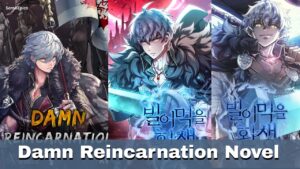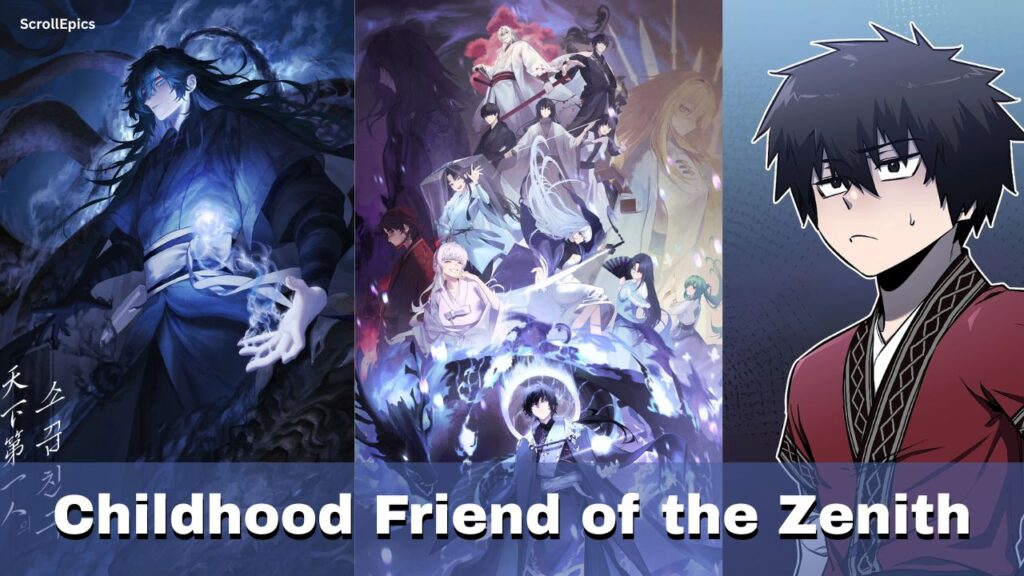At first glance, Damn Reincarnation looks like another standard Korean fantasy—reincarnation, demon lords, a destined hero, and plenty of training arcs.
But don’t let the familiar setup fool you.
This isn’t just about raw power or flashy battles. It’s about finishing a story left unresolved 300 years ago, carrying the weight of past lives, and watching a protagonist who is cool, flawed, and surprisingly human try to balance strength with identity.
The result? A sprawling, character-driven novel with moments of brilliance—sharp fights, layered worldbuilding, and emotional arcs that resonate, but also some glaring flaws, especially when it comes to pacing and romance. For many, it’s a masterpiece of the fantasy genre. For others, its later arcs test patience. Either way, it’s a story that leaves a mark.

Where to Read Damn Reincarnation Online
You can read Damn Reincarnation officially through the following platforms:
-
Wuxiaworld – The primary platform offering the complete, officially licensed English translation. Readers frequently praise the high translation quality and consistent updates.
-
Amazon Kindle – Available in volume format for purchase, letting you read on Kindle devices or apps.
-
Tapas – Another platform where parts of the novel are published, often with mobile-friendly formatting.
These platforms provide legal, high-quality translations, ensuring the story and characters come across as the author intended.
What Damn Reincarnation Is Really About?
At its heart, Damn Reincarnation is a story about legacy and unfinished battles. Three centuries after a war against the demon lords, the hero returns, not reborn as someone new, but carrying the weight, memories, and regrets of his past life. This isn’t simply about reincarnation for the sake of power; it’s about continuing what was left undone and facing enemies who have grown stronger in his absence.
What sets the novel apart is its protagonist. He isn’t written as a flawless savior or a hollow powerhouse. Instead, he’s a mix of strength and humanity, calm and decisive in battle, but also stubborn, petty, and at times frustratingly immature. That balance makes him feel real. He’s strong, but never so overwhelming that the fights lose tension. Every victory is earned through grit, training, and sheer willpower.
The world around him reflects the same sense of weight. Nations and kingdoms are built with care, each with their own politics and history, and the demon lords are more than just one-dimensional villains, they’re rulers, strategists, and powers who have evolved over the centuries. This sense of progression keeps the stakes alive: the world hasn’t been waiting idly for the hero’s return.
Of course, the novel isn’t without flaws. Romance and harem elements become a larger part of the narrative as the story progresses, but they often feel awkward or drawn out. While some relationships have heart, others come across as forced or even damaging to the protagonist’s image. For many, this shift slows down the pacing, especially past the mid-point of the series.
Still, beneath those missteps lies the true strength of Damn Reincarnation: a tale of determination, responsibility, and a world that refuses to stop moving forward. It’s less about being perfect and more about struggling with the burden of the past while carving out a new future.
Battles That Carry Weight
One of the strongest aspects of Damn Reincarnation lies in its combat. Fights are intense, strategic, and never feel like empty spectacle. The protagonist doesn’t sweep aside every enemy with ease—he earns his victories through grit, training, and resilience. This keeps tension alive, especially since side characters are not passive spectators; they have distinct abilities and often turn the tide in meaningful ways.
Training arcs also play a major role, showing that power comes at a cost. Instead of rushing through development, the story lingers on the exhausting process of growth, making every new ability or weapon feel deserved. This approach keeps battles grounded and gives them lasting impact.
Still, pacing can sometimes drag. Extended stretches of romantic comedy or harem subplots interrupt the intensity, slowing momentum and frustrating readers who came for the action and plot progression. Despite that, the heart of the story continues to beat in its clashes—moments where blades, magic, and determination decide the future.
A World Built on Legacy
What makes the setting of Damn Reincarnation compelling is that it doesn’t reset for the hero’s return. Three hundred years have passed, and the world has changed. Demon lords still rule, kingdoms have evolved, and allies and enemies alike carry their own agendas. This continuity adds a sense of realism—the stage isn’t waiting idly for the protagonist, it’s been moving forward without him.
The political and cultural depth of the kingdoms adds richness, giving every region a distinct identity. Power structures feel carefully balanced, with nobles, heroes, and demons all shaping the flow of events. Even side characters benefit from this worldbuilding, many receiving real growth and arcs that extend beyond the protagonist’s shadow.
Interestingly, the demon rulers themselves aren’t portrayed as one-note villains. Their empires prosper, their people thrive, and their leadership isn’t without merit. That complexity challenges the protagonist’s crusade, raising questions about justice and necessity. Why destroy a stable empire simply because its leaders are demons? This moral tension deepens the stakes and makes the journey more than a simple good-versus-evil clash.
While the narrative occasionally leans on convenient twists to resolve crises, the majority of its worldbuilding feels deliberate, layered, and impactful. It’s a setting that resists easy answers and constantly forces its characters to prove themselves.
Strengths and Weaknesses of Damn Reincarnation
Like many long-running Korean web novels, Damn Reincarnation shines brightest in some areas while stumbling in others.
What It Does Well
-
Character Depth: The novel gives space for more than just the protagonist to grow. Characters like Ciel, Cyan, and Ancilla each have their own development arcs, and even supporting figures such as Molon, Carmen, or Melkith leave a strong impression. Their interactions feel authentic, often carrying humor, tension, or emotional weight.
-
Fights with Impact: Battles never feel cheap. The protagonist works for his strength, and fights highlight strategy, endurance, and growth. This makes both victories and failures land harder.
-
Worldbuilding with Continuity: Instead of a frozen backdrop, the world has moved on during the centuries since the last war. Demon lords rule prosperous empires, kingdoms evolve, and politics influence every conflict. This gives the story a sense of realism and momentum.
-
Balanced Power Scaling: The power system avoids becoming absurdly overblown. While the protagonist grows consistently, his strength doesn’t erase tension—side characters and enemies remain formidable, keeping stakes alive.
Where It Struggles
-
Romance and Harem Elements: Perhaps the most divisive aspect of the novel. While some relationships—like those involving Sienna, Kristina, or Anise—are heartfelt, others feel forced or drawn out. Extended harem subplots often overshadow the main narrative, slowing pacing and leaving readers frustrated.
-
Pacing Issues: The story begins with a strong balance of training, battles, and exploration, but later arcs sometimes drag. Long stretches of comedic romance or repetitive gags disrupt momentum, especially beyond the mid-point of the series.
-
Occasional Convenient Resolutions: At times, conflicts resolve through sudden miracles or plot devices rather than earned strategy, undercutting the otherwise consistent tone of struggle.
The Overall Balance
When Damn Reincarnation leans into its strengths—tight battles, layered worldbuilding, and genuine character arcs—it delivers some of the most engaging fantasy writing in the genre. But when romance hijacks the pacing or convenient resolutions creep in, it risks losing focus.
The result is a novel that is far from perfect but still memorable—capable of evoking both deep admiration and sharp criticism from its readers.
Character Guide of Damn Reincarnation
Here’s a breakdown of the key players shaping the narrative, their roles, and why they stand out in this richly imagined world.
Eugene Lionheart (Hamel Dynas) — The Reincarnated Warrior
-
Identity & Background: Formerly Hamel Dynas, one of the Five Great Heroes who nearly toppled the Demon Kings, Eugene is reborn 300 years later as a descendant of Vermouth Lionheart.
- Motivation: Armed with memories of his past life, his renewed strength, and a resolve to finish the task he once failed, he sets out to confront both demons and his own legacy.
- Personality: Brash, stubborn, and blunt, Eugene wears his flaws on his sleeve. His mix of confidence and emotional complexity—alongside occasional immature outbursts—makes him both compelling and relatable.
Ciel Lionheart: Eugene’s twin niece—a noble knight with her own ambitions and gentle strength.
Cyan Lionheart: The other twin, future heir to the Lionheart family, known for strategic thinking and restraint.
Carmen Lionheart: A formidable commander among the Black Lion Knights; disciplined, stoic, and deeply respected.
Sienna Merdein: The Archwizard from the legendary Five Great Heroes; wise, powerful, and instrumental in shaping the world’s magic system.
Anise Slywood: The devout Saint of Yuras, known for fierce faith and righteous convictio.
Melkith El-Hayah: Revered Master of the White Magic Tower and expert spirit summoner, she offers both guidance and leadership.
Noir Giabella & Gavid Lindman: High-ranking demon figures within Helmuth’s hierarchy, each wielding significant influence and power—Nuanced threats, not just face-value villains.
Is Damn Reincarnation Worth Reading?
Damn Reincarnation is not a flawless novel—but it is a memorable one.
Its greatest strengths lie in its fights, worldbuilding, and character arcs. Battles are tense and hard-earned, the world feels alive with kingdoms and demons that evolve across centuries, and the cast of supporting characters is rich enough to stand alongside the protagonist. At its best, the novel balances action, emotion, and mystery in a way few web novels manage.
But the story also stumbles. Romance and harem elements often drag down the pacing, particularly in later arcs, with relationship drama overshadowing key conflicts. Some resolutions arrive too conveniently, undercutting the otherwise gritty tone. For readers who value consistent focus, these flaws may frustrate.
Still, for those who embrace its highs and endure its lows, Damn Reincarnation offers a long, ambitious journey—one that combines humor, tragedy, and raw determination into a fantasy worth remembering. It doesn’t always deliver perfectly, but when it does, the payoff is powerful.
Damn Reincarnation FAQ
What is Damn Reincarnation about?
It follows Eugene Lionheart, the reincarnation of Hamel Dynas, one of the Five Great Heroes who once fought the Demon Kings. Three hundred years later, he is reborn with his past memories and must face a world that has changed without him, while carrying the burden of finishing what he once started.
Where can I read Damn Reincarnation?
The official English translation is available on Wuxiaworld, with licensed versions also accessible through Amazon Kindle and Tapas.
Is the novel complete?
The Korean version is ongoing, but the English translation on Wuxiaworld is steadily catching up with regular updates.
Does it have romance or a harem?
Yes. The novel includes romance and harem elements, though opinions are divided. Some readers find relationships heartfelt, while others feel the harem subplots slow the pacing and detract from the main story.
How long is the novel?
As of now, the series has over 600 chapters published in Korea, with the English version actively being translated and released.
Is it dark or violent?
The novel contains graphic battles, intense training arcs, and morally complex choices. While it’s not grim for the sake of shock, the stakes are high and the story doesn’t shy away from brutality when needed.

